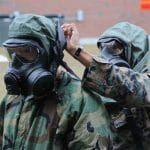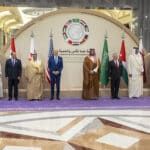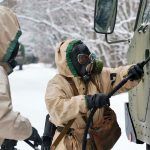How Russia worked to undermine UN bioweapons investigations
By Filippa Lentzos, Jez Littlewood | December 11, 2020
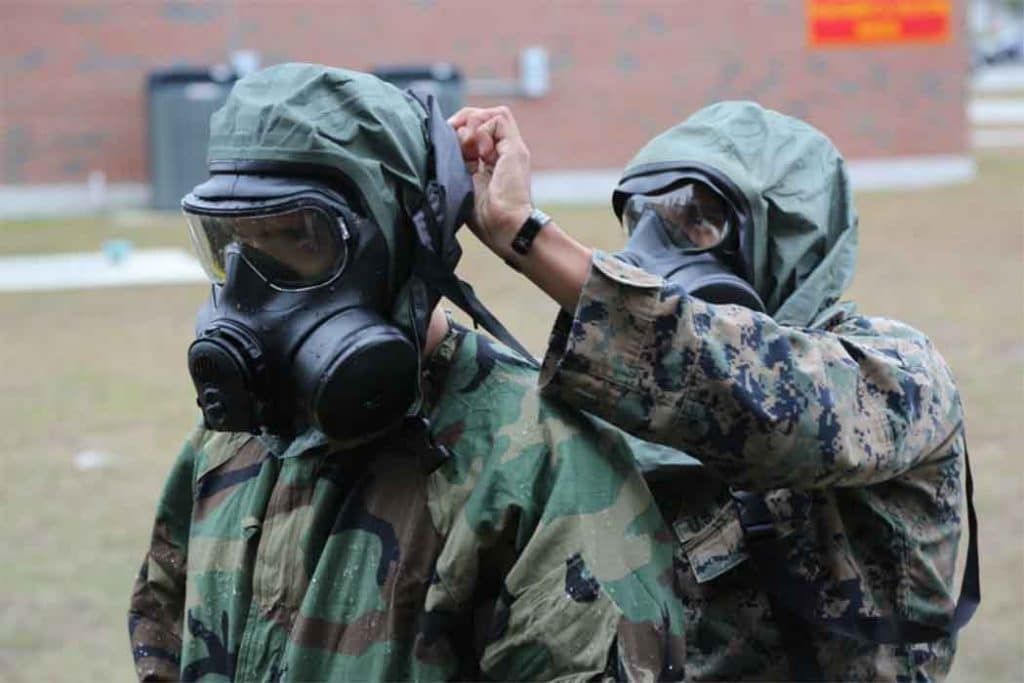 US soldiers practice responding to a chemical or biological weapons attack. Credit: Salvador R. Moreno/US Marine Corps.
US soldiers practice responding to a chemical or biological weapons attack. Credit: Salvador R. Moreno/US Marine Corps.
This past October, while much of the world’s focus was on the raging coronavirus pandemic and the US presidential election, Russian diplomats introduced a highly controversial resolution to the General Assembly of the United Nations, one that would have weakened the 40-year-old mandate of the UN secretary-general to investigate allegations of chemical or biological weapons use.
To anybody paying attention, the “why” behind the resolution was obvious. Independent technical investigations have been shown to work in practice, and Moscow wanted to wrest back control over future international investigations by putting the UN Security Council, where Russia has veto power, in charge.
The historic irony is that it was precisely because of the inability of the Security Council to reach agreement on how to respond to allegations of chemical weapons use in South East Asia and Afghanistan in the late 1970s that the General Assembly granted the secretary-general a mandate to investigate such allegations in the first place.
Despite Russia’s intense diplomacy, by the time of the Nov. 4 vote, Moscow faced an unprecedented defeat.
That a relatively obscure investigation process took center stage at the United Nations in the midst of a pandemic, upstaging a packed agenda on nuclear weapons, the weaponization of space, and cyber warfare, reveals the debate over the resolution as a proxy dispute about the future of disarmament and the investigation of potential treaty violators. That dozens of countries sided with Russia is an indication of the challenge that countries seeking accountability for violations of chemical and biological weapons treaties face.
It’s a challenge that gained steam in 2013, when Secretary-General Ban Ki-moon conducted investigations into chemical weapons use in Syria, including allegations that the government attacked civilians using sarin gas. Ban’s investigations precipitated a move by the global community to take a more assertive stance on chemical weapons use.
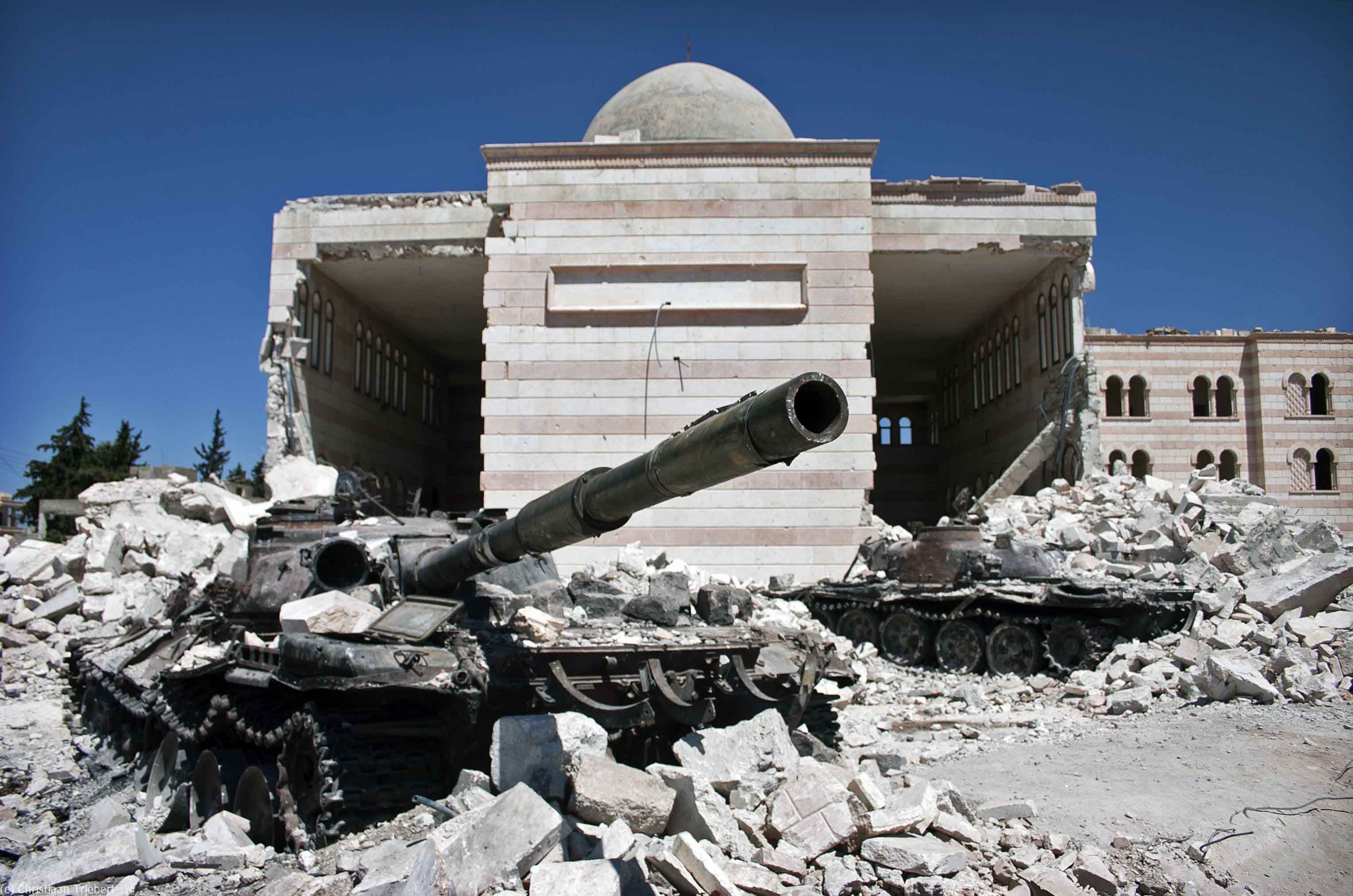
The Ghouta attack and attribution. In the early morning hours of Aug. 21, 2013, Ghouta, a suburb of the Syrian capital Damascus, was attacked by specially designed surface-to-surface rockets with 50-liter payloads of the nerve agent sarin. The falling night temperatures meant the air was moving downwards towards the ground, maximizing the potential impact of the gas.
As the rockets pounded houses, apartment buildings, stone-tiled terraces, and backyards in Ghouta, the heavy gas they released stayed close to the ground, penetrating into basements where people were seeking shelter.
The first responders arriving on the scene described large numbers of people lying on the ground, many of them dead or unconscious. An officer with the rebel Free Syrian Army, Captain Alla’a al-Basha, who came with his team to help, recounted: “I saw bodies scattered in the streets. I saw whole houses – none of their residents were alive.” He described seeing victims struggling to breathe, writhing in distress. He saw a woman tearing at her clothes as she suffocated.
Footage from the horrific night shows people convulsing, gasping for air, and vomiting as the gas turned their own nervous systems against them.
Thousands of people flooded hospitals that were already suffering shortages of trained staff, medicine, oxygen, electricity, and even beds. One doctor, Ali Abu Emad, attending more than 100 children that night, recalled: “Some of the children came to the hospital in a very bad state and they died after an hour or two. Some stayed alive for the second day, others for the third and then they died. Some of the children died in my arms.”
A day after the ferocious assault on civilians, a body count in Ghouta’s 25 makeshift medical facilities found nearly 1,500 people dead and more than 10,000 affected. Several hundred of the dead were children. Then US President Barack Obama spoke of “young girls and boys gassed to death by their own government.” Emad, the Ghouta doctor, said: “The children’s faces have not left me.”
It was the worst chemical weapons attack of the 21st century.
Sadly, the attack was not unprecedented. The Ghouta massacre echoed equally distressing scenes a quarter century earlier from Halabja, a Kurdish town near the Iraqi border with Iran where the Iraqi military targeted vulnerable civilians with chemical weapons during the Iran-Iraq war. That attack is estimated to have killed thousands.
News reports, photos, video footage, and eye witness accounts relayed the horrors of what happened in Ghouta to the world, but it was the evidence systematically and meticulously collected by independent expert teams on request from the UN secretary-general that enabled the international community to collectively agree on and reckon with what took place.
In presenting the investigative report on Ghouta to the Security Council, Ban said: “The international community has pledged to prevent any such horror from recurring, yet it has happened again.” He stressed that the countries of the world have a responsibility to hold the perpetrators accountable and to ensure that chemical weapons never re-emerge as an instrument of war, but he did not apportion blame for the attack.
Some called for even stronger action.
The US Ambassador to the United Nations at the time, Samantha Power, railed against her counterparts who condemned the sarin attack in a passive voice: “[I]t is not enough to say ‘chemical weapons were used’—any more than it would have been enough to say that ‘machetes were used’ in Rwanda in 1994. We must condemn the user.”
As it stands, attributing responsibility is outside the remit of investigations by the secretary-general; the mandate of those inquiries, including the Ghouta investigation, is limited to verifying whether a chemical weapons attack had taken place or not.
Yet, the continuing use of chemical weapons in Syria since the Ghouta massacre spurred a group of countries led by France to action. In June 2018, the coalition of countries forced a vote by Chemical Weapons Convention members to empower Syria investigations with the ability to attribute responsibility. They won by a clear majority of 82 to 24 votes.
China, India, Iran, Syria and Venezuela were among those voting against. Russia, however, was the most forceful dissenter. A year prior, in the Security Council, Russia had used its veto power to terminate Security Council investigations in Syria with the Organization for the Prohibition of Chemical Weapons. Now, in 2020, Moscow is redirecting its efforts to undermine the work of international investigation teams and their authority by targeting the framework that gives the secretary-general power to launch independent investigations into allegations of chemical or biological weapons use. (The Organization for the Prohibition of Chemical Weapons still retains its ability to investigate allegations of chemical weapons use and to assign blame.)
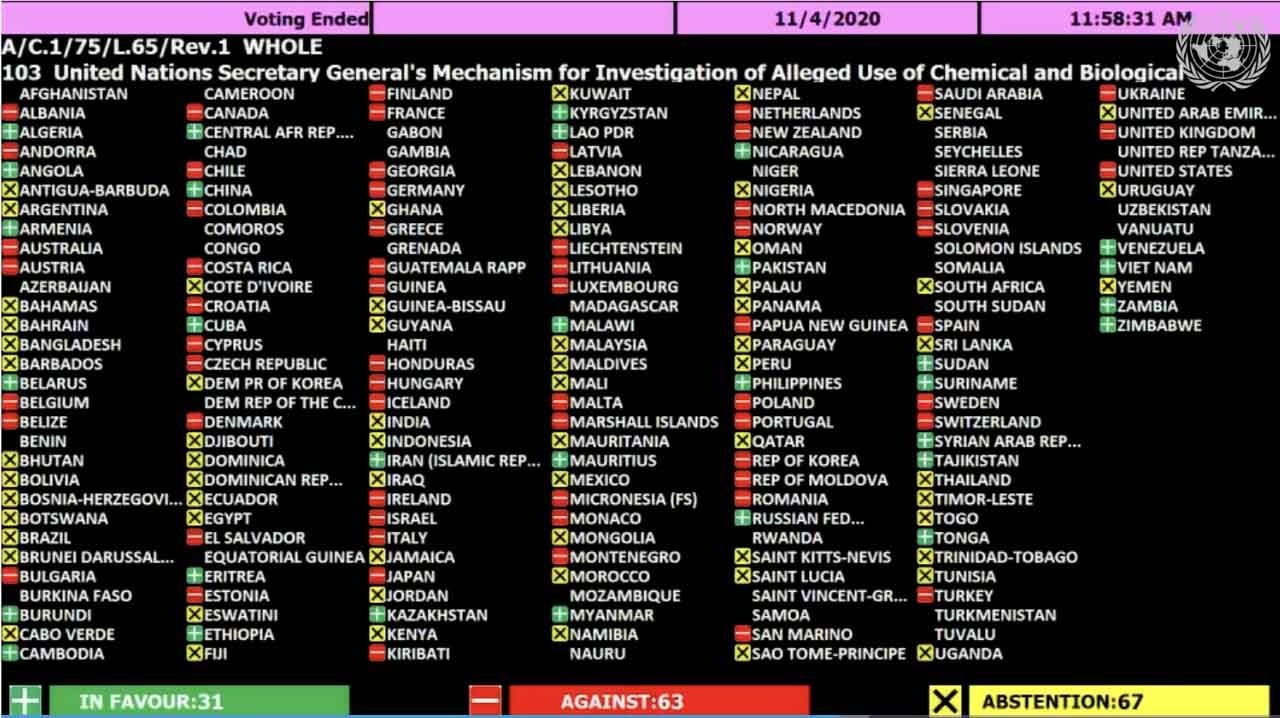
A Russian resolution. In October 2020, Russia introduced a resolution to the General Assembly aimed at updating procedures related to the secretary-general’s investigative mandate—formally known as the Secretary-General’s Mechanism for Investigation of Alleged Use of Chemical and Biological Weapons. Russia argued that much had changed in the scientific, technical and diplomatic environment in the 30 years since guidelines for secretary-general investigations were agreed on in 1990 and that a review was warranted. In fact, the proposal was a sly effort to significantly undermine the authority of the secretary-general to investigate what happened in incidents like Ghouta.
Much of the resolution seemed harmless and even constructive. It was framed by preliminary language that it is in everyone’s common interest to completely exclude chemical and biological weapons, and that the General Assembly is dedicated to protecting humanity from these weapons. It recognized how essential the chemical and biological weapons conventions are for international peace and security and emphasized the substantive role played by the Security Council.
Yet, beneath the surface of the resolution’s anodyne language it was apparent that the motive behind the resolution was in fact not to strengthen the ability of the secretary-general to investigative chemical and biological weapons use, but to weaken it. The resolution would shift a secretary-general’s investigation into a subservient role to the chemical and biological weapons conventions, and, ultimately, to that of the Security Council, where Russia holds veto power over any decisions, including those dealing with chemical and biological weapons issues.
Russia’s resolution would have politicized what had been carefully designed to be an independent and technical investigation process. The proposal also purposefully ignored updates to the technical guidance since 1990 to give its argument more effect.
While Russian diplomats worked mightily with other countries to try and get an acceptable draft of the controversial resolution, eventually only three countries co-signed the document: China, Nicaragua, and Venezuela.
The resolution faced harsh push back.
Prior to the vote, the European Union issued a detailed critique of Russia’s resolution, decrying it as politically motivated. “The independence of the [secretary-general’s investigatory] instrument is a crucial guarantee to UN Member States that….the launch of [an] investigation cannot be blocked by another Member State due to political motives. This independence should not be called into question, not even indirectly.”
Kelly Craft, the US Ambassador to the United Nations, wrote a letter to other UN missions saying the United States saw Russia as seeking to “significantly damage” the secretary-general’s investigations and strongly urged other countries to vote “no” on the resolution.
The secretary-general’s investigation mechanism had “proven its value” in the Ghouta investigation in 2013, the United Kingdom, Switzerland, and Australia said.
In the end, the resolution faced an overwhelming rejection. There were only 31 votes in favor of the Russian proposal, with 63 votes against, and 67 abstentions.
An old split. The Russian resolution and other efforts to weaken international capabilities to undertake impartial and objective investigations into allegations of chemical and biological weapons use are stark reminders that the geopolitical calculations that have divided the world before continue.
On one side in the November vote were countries like China, Cuba, Iran, Russia, Syria, and Venezuela, who supported the primacy of state sovereignty and the veto powers of the Security Council. On the other side were countries in the European Union, Australia, Canada, New Zealand, Switzerland, the United Kingdom, and the United States, seeking to uphold available mechanisms to bypass the veto of the Security Council and reduce the primacy of sovereignty. Stuck in the middle were countries like Argentina, Brazil, India, Indonesia, Malaysia, and Mexico, who did not wish to be forced publicly to choose between these two poles.
In 1980, when Western countries first proposed a General Assembly resolution to give the secretary-general a mechanism for investigating biological and chemical attacks, it was adopted in a 78-to-17 vote that fell largely along the lines of Cold War alliances. Thirty-six countries abstained from the vote altogether.
Julian Perry Robinson, who for decades helped guide international thinking on chemical and biological weapons, noted at the time that the politics of the Cold War ruled, “with the division of the General Assembly vote [falling] emphatically along East–West lines and a clear disinclination on the part of prominent sectors of the nonaligned world to become involved.”
Today, the stakes of global division are even higher. The Syrian conflict involved widespread use of chemical weapons and they have been used in Iraq by a terrorist group. Beyond their use by terrorists and in internal conflicts, certain chemical weapons (Novichok and VX) have been used recently as weapons of assassination.
The Chemical Weapons Convention has, overall, coped well with the alleged use of chemical weapons over the last seven years. Its counterpart, the Biological Weapons Convention, has no dedicated international organization to implement it and no verification provisions. As a result, any alleged or suspected use of a biological weapon would require countries in the convention to either seek a Security Council or a secretary-general’s investigation.
While there have not been any requests for investigations into alleged biological weapons use to date, the COVID-19 pandemic has raised concerns about the potential attractiveness of disease as a weapon, demonstrating the need to ensure appropriate investigation mechanisms are in place. Some countries, key among them Russia, want the Security Council—where a veto can prevent an investigation—to control any future investigations into biological weapons use.
Why obstruct independent investigations? The single most important lesson from investigations into alleged chemical weapons use is that intrusive investigations can work. Notwithstanding the differences between an epidemiological investigation of a suspicious disease outbreak and the chemical detection investigation of a chemical event, experience in investigating chemical weapons allegations—from the UN Special Commission on Iraq in the 1990s and the Syria missions in the 2010s—point to the fact that investigations work. All countries have learned this, even if some dislike it.
The consequence has been greater efforts to stop, hinder, undermine, and contest the authority and work of investigation teams.
These obstructionist approaches are playing out in multiple realms—in formal diplomatic settings, such as at the Organization for the Prohibition of Chemical Weapons (the administrative body that implements the chemical weapons treaty) and the United Nations, as well as in misinformation and disinformation campaigns aimed at influencing perceptions about the validity, accuracy, and fairness of investigations.
The Syrian and other experiences point to investigations becoming more contentious, complex, and important, suggesting any secretary-general-led bioweapons investigations, if they are to occur, will be politically difficult and technically complex. They also suggest that if the perpetrator has a protector on the Security Council, any efforts to assign blame will be challenged at every level.
Russia’s underhand proposal to give more power to the Security Council over chemical and biological weapons investigations is not, as Russia would have others believe, a sign of the inability of the secretary-general to conduct such investigations. Rather, it is a signal that Russia, and those like China that supported the Russian resolution right from the start, fear the possibility that an independent impartial process might be beyond their control and veto.
Forty years after the General Assembly gave the secretary-general broad authority to investigate alleged chemical and biological weapons use, that power is still under threat, particularly when it comes to investigating allegations of biological weapons use given that no organization exists to implement the Biological Weapons Convention.
For now, the General Assembly has successfully fought back the thinly veiled attempt to diminish the secretary-general’s authority, but there is plenty more work to do. Investigator training, lab networks and other operational arrangements need to be strengthened so that, if an allegation of biological weapons use arises, the international community can conduct a rigorous investigation. And, in time, the secretary-general will need new formal procedures for attributing attacks.
The international community will need the ability to demand accountability for the use of weapons that should never under any circumstances be used.
Together, we make the world safer.
The Bulletin elevates expert voices above the noise. But as an independent nonprofit organization, our operations depend on the support of readers like you. Help us continue to deliver quality journalism that holds leaders accountable. Your support of our work at any level is important. In return, we promise our coverage will be understandable, influential, vigilant, solution-oriented, and fair-minded. Together we can make a difference.



